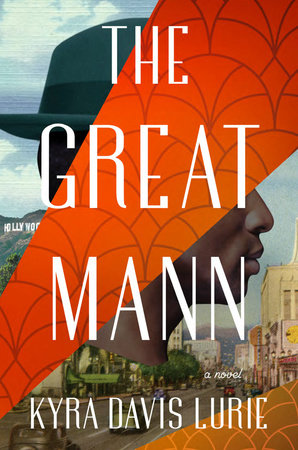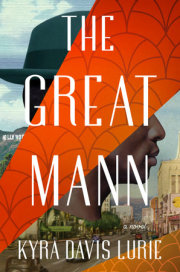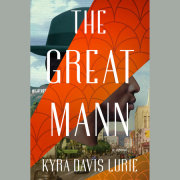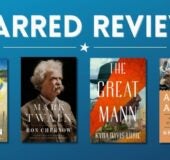Chapter 1“Wake up, I said it’s the end of the line.”
My eyes fly open, my hand automatically reaching for my weapon. But instead of metal, I find paper.
This isn’t Bastogne. I’m not in the middle of a battle-scorched forest. And the words aren’t coming from a Kraut. Instead, it’s the old Chicano who’s been sitting next to me since he boarded the train back in Texas, his heavy jowls draped over a frown as he shakes me awake. In my other hand is a folded-up copy of the Chicago Defender, a newspaper, not a grenade. The ink’s been smudged at the top so all that you can see of the date is the 45. But I know it’s October. I know the war’s over. The place I was just in while sleeping . . . that was just a nightmare’s retelling of a memory. Guess that’s why those Nazis were wearing white hoods.
“Son, we’ve reached Los Angeles,” the frowning man says. “You’re blocking my way.”
I grab my duffel and join the line of all the folks deboarding, making way for the white ones as a precaution. Got to figure out the rules of this place before deciding if they’re worth breaking.
On the platform, I stop to read the giant clock hanging over a newsstand across the way before being startled by a sudden impact. I’m being pushed . . . no, more like bumped out of the way by some careless white man in a rush. He presses past toward some destination, cheerily using his shoulders and elbows on everybody blocking him, no matter their color or sex.
Something’s different about this place.
Maybe it’s the air, unseasonably warm for autumn. It pours into your lungs, thick, like this crowd. All these white folk looking hurried.
But there’re a few folks here with skin like mine. Negroes dressed like they’re ready for church.
I’m dressed for war.
I changed into my uniform somewhere ’round Arizona.
Margie says they respect uniforms out here. Not like back home where any Negro in uniform is a target. Maybe I shouldn’t put so much trust in my cousin’s assurances, seeing as I haven’t seen her since we were both half the height of a tobacco plant. What do I really know of her now? In those two decades since her family fled our hometown, she may have written me half a dozen letters in total—most of them filled with nothing more than exaltations over the latest romantic Hollywood movie that made her laugh or cry. She rarely ever wrote about anything real.
I didn’t get around to watching most of what she recommended because the nearest theater open to Negroes was forty miles from my home. Instead, I used my letters to describe the books I loved although reading had never been her passion. Then three years ago, I got to see Casablanca while training at Camp Hood and I wrote to tell her how much I liked it. When she wrote back, she suggested I come out to L.A. after the war, where I could both find a good job and occasionally accompany her to the movies that her husband didn’t have the patience to sit through. At the time, I wasn’t sure I’d take her up on it.
Yet here I am.
Maybe it was foolish to assume the girl who had always made me laugh had grown into a woman who could guide me right. But looking around . . . I don’t think so.
It’s different here.
I see it in the way these people ain’t seeing me. I’m accustomed to white folk sizing me up, trying to work out if I’m a predator they can beat down to prey.
Invisibility feels clean.
Except I do feel one pair of eyes. A Negro girl, dressed like she’s headed to a lily-white country club, her skin walking the line between copper and gold. That girl’s smiling at me like she knows me.
I’d like to know her.
My train arrived early, so I got time to kill before Margie shows to fetch me. I navigate through the maze of people, heading toward those seeing eyes until I’m close enough to smell just a hint of perfume. “Somethin’ I can help you with, miss? I’m new ’round here, but I can work out a train schedule if you need it.”
“Why, don’t you recognize me?”
Her voice. Light, sweet . . . familiar.
And the laughter bubbling out of her, I know that, too.
“Charlie, it’s me, Marguerite!”
Can’t be. I’ve never met this woman before me.
“Margie, that really you?” When her smile gets bigger, I see it. The undeniable spark of mischief her mama was always trying to slap out of her. “Damn, girl, you changed! You out here looking like a movie star!”
“Hush, I’m the same girl you knew from Miss Peesly’s class.”
Now she’s got me laughing. The idea of this woman, in her tailored jacket and unscuffed shoes, that she could have anything to do with the one-room school-house where lil’ Margie and I used to spend our days! A girl we called Margie ’cause she was too tiny to bear the weight of that foreign-tongued name Uncle Morris brought back from the Great War. A cheap, expensive gift for his next-born daughter.
But then, overnight, four days before her ninth birthday, Margie and her family picked up and left.
Seems she used all those years to expand into the rest of those French syllables.
“I think you’re the one who’s changed the most,” she says, taking a step back to get a better look at me. “Tall, handsome, and . . . oh, you have medals!” She gestures at the ribbons on my chest. “You never mentioned them in your letter! How thrilling! Did you get them saving a damsel in distress?”
I force a smile even though I’m also gritting my teeth. “Don’t think they give out medals for saving pretty girls.” I can’t hold her flippancy against her. All she knows of the Nazis is what she’s seen in the movies. Hollywood makes them seem like genteel villains, not the swastika-wearing sadists I encountered on the battlefield.
“No, I suppose not, there are other awards for that.” She gives me a playful wink. “Anyway, you always were my hero. Ever since we were babes.” I don’t move as she reaches to touch my face, so tender you’d think we ain’t cousins and she ain’t married. “Is it my imagination, or are you one tooth short?”
Shouldn’t have smiled so wide. Don’t like thinking about things others knocked out of me.
“I happen to know a marvelous dental surgeon, Dr. John Alexander Somerville. Graduated top of his class at the University of Southern California. They say he’s the best in the whole state. I do believe he could give you a smile that all the pretty girls would feel compelled to return.”
“I don’t got money for nothin’ like that.”
“Oh, John’s a friend. Perhaps he’ll do me this favor.” She turns and starts walking, her confidence a clear sign I’m meant to follow.
“This must be some kind of paradise.” I direct the words to her shoulder blades, moving with rhythm as she leads me out of the station. “Even in Europe, I can’t imagine a white man doing that kind of favor for a Negro.”
“He’s not white. He’s one of us.” There’s a line of freshly waxed automobiles up along the sidewalk. Few of them got Negro drivers, looking sharp in their black suits and caps. And they’re looking at Margie with the same kind of wonder I’m feeling. The cloth her clothes are cut from looks too expensive for our kind. Her hands look like they never washed a dish, and the diamond sitting on her finger is either fake or looted from the goddamned Louvre.
I look up at the distant hills that press against the skyline. I can just barely make out the white letters mounted on the closest one. “That’s the Hollywoodland sign!”
“That old thing?” She briefly tilts her head in the far-off direction. “It’s a bit of a wreck, but the city says they’re going to spruce it up. Maybe remove the land so it just says Hollywood, which would make more sense. Speaking of Hollywood, I saw that flick you liked so much, Casablanca? You didn’t tell me how sad it was! Bogart doesn’t even get the girl! He sends Ingrid Bergman away!”
“Yeah, but you gotta remember, in the movie, Bergman’s married to another man. That’s who she ends up with,” I point out.
“Paul Henreid? Please, Bogart is much more dashing.” Margie shakes her head, as if disappointed by the whole affair. “I’m done with sad movies. Now that the war is over, perhaps there will be more fun films in the theaters for us to see next year.” She stops in front of a Lincoln Continental. “Hop on in!”
“Girl, you’re pullin’ my leg, this ain’t your car!”
“I’m afraid it is.” She laughs, dangling the keys in front of me. “I promise I haven’t run over a single thing.”
Negroes don’t drive cars like this. Not in Virginia, not here. I can see the truth of it on the faces of the Negro drivers still checking her out.
She takes my arm, brings her singsong melody down to a volume just north of a whisper. “My husband would prefer I have a driver. But we can’t quite afford it. Not yet.”
She releases me, unlocks the door, and gets behind the wheel.
Copyright © 2025 by Kyra Davis Lurie. All rights reserved. No part of this excerpt may be reproduced or reprinted without permission in writing from the publisher.








